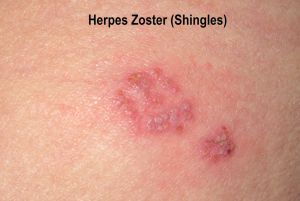 Shingles (or Herpes Zoster) is a skin disorder, which manifests itself as a painful rash with small blisters. It is usually found on the upper body, mostly in the abdomen, arms and the face. Sometimes a shingles breakout can affect the legs too. A shingles breakout is usually preceded by a fever, headache, fatigue, muscle soreness, stomach upsets and in some cases diarrhea. The rash appears three to five days after these symptoms.
Shingles (or Herpes Zoster) is a skin disorder, which manifests itself as a painful rash with small blisters. It is usually found on the upper body, mostly in the abdomen, arms and the face. Sometimes a shingles breakout can affect the legs too. A shingles breakout is usually preceded by a fever, headache, fatigue, muscle soreness, stomach upsets and in some cases diarrhea. The rash appears three to five days after these symptoms.
Shingles are caused by the Varicella-Zoster virus, which is also responsible for the chicken pox. These two diseases are very closely linked to each other and Shingles usually appear if someone already had chicken pox in their earlier years. The virus usually stays in the body after chicken pox clears but is usually held in check by the body’s immune system. Shingles is a disease common in people over the age of 50 as the body’s immune system is weakened with age.
There are two major types of vaccines for shingles.
The first one is the varicella vaccine, which technically isn’t a shingles vaccine but a chicken pox vaccine. Since the prevention of chicken pox will subsequently protect you from shingles, it is also listed as a shingles vaccine. The varicella vaccine is usually administered to children before they contact chicken pox. For children, the first varicella shot is administered when they are 12 – 15 month old and a second dose when they are 4 – 6 years old. Older children, and even adults, who have never contacted chicken pox, also get two doses, with the second dose administered after 4 – 8 weeks. The varicella vaccine is however useless for those who have already contacted chicken pox and are still at risk of getting shingles.
The ‘proper’ shingles vaccine is called Zostavax. It is a more potent version of the varicella vaccine. The Zostavax vaccine is highly recommended for adults approaching 50 years of age, as this is when Shingles are most likely to strike. People who have already received the Varicella vaccine are not required to get the Zostavax vaccine although there are no harmful effects of getting both.
However, if you have a medical condition that suppresses your immune system like HIV/AIDS you should not get either of the two vaccines as they are ‘live vaccines’ which contain the Herpes Zoster virus in a subdued state which is normally harmless in people with a healthy immune system but can be dangerous if your immune system is compromised. People taking immune suppressing medication and drugs such as steroids and cancer treatments (both chemotherapy and radiotherapy) should also not take any shingles or chickenpox vaccine. Pregnant women are also not supposed to get the vaccines.
If you are allergic to gelatin and/or neomycin (an antibiotic found in both the varicella and Zostavax vaccines), you should also give the vaccines a very wide berth.
Some side effects that are associated with the Zostavax and varicella vaccines include a mild rash on the vaccinated area, headaches and a mild fever. In case any of these symptoms become severe, you should not hesitate to consult your doctor.
Related articles
- Shingles vaccine campaign to start (bbc.co.uk)
- Merck’s Shingles Vaccine Not Reaching Enough U.S. Adults – Bloomberg (bloomberg.com)
- Free Shingles vaccinations (andiradi.wordpress.com)
- Shingles – A Painful Rash and More (heal-herpes.com)